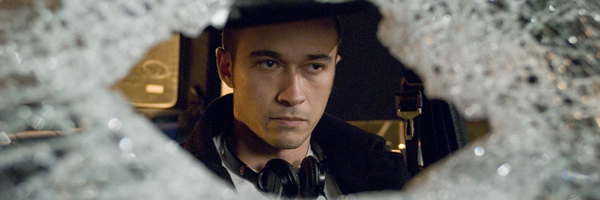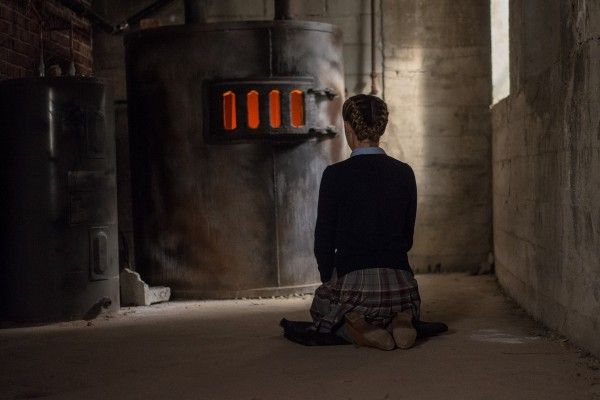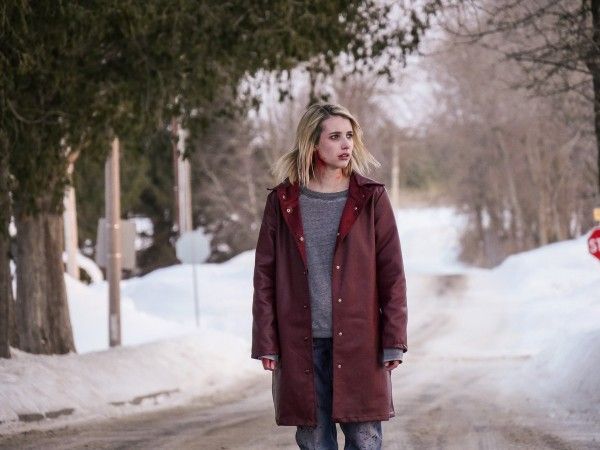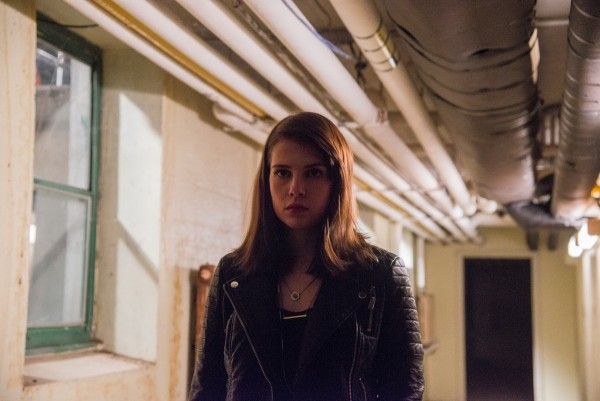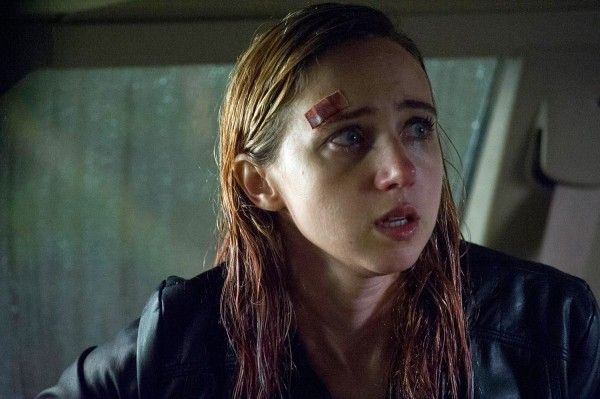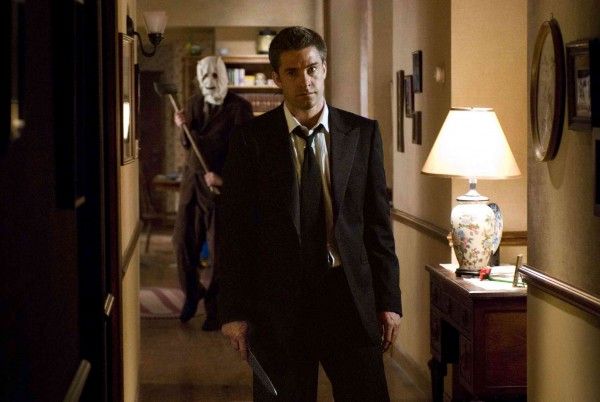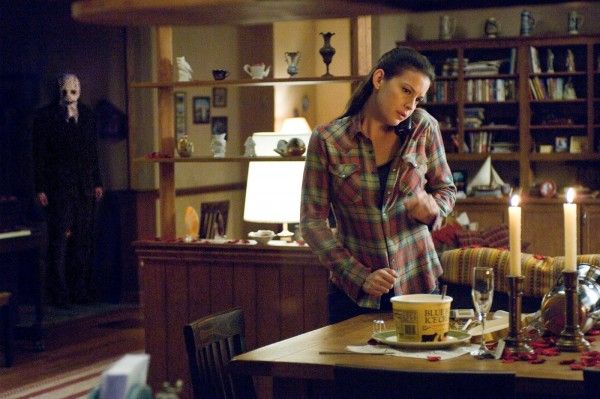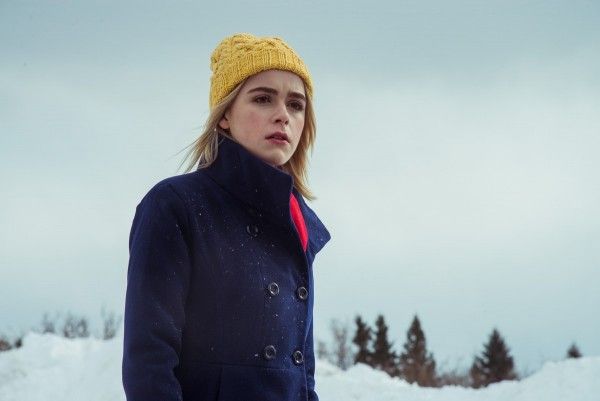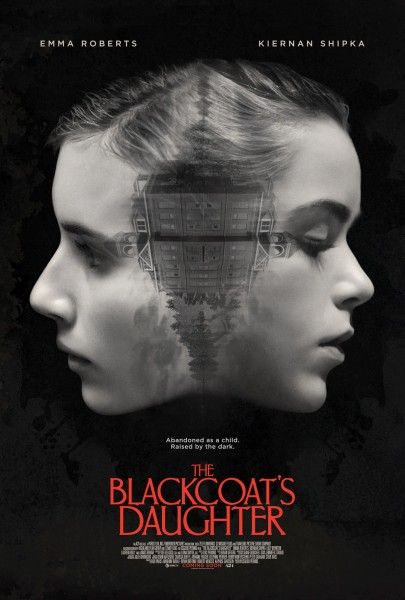Bryan Bertino's feature film debut The Strangers came at the end of an era for horror films. Specifically, the era where studios were eagerly throwing sizable budgets toward original genre productions. The home invasion hit was shot for $11 million, on film, and went on to gross more than $80 million domestically before the age of digital filmmaking and microbudgets redefined how hit horror movies got made. A near decade later, Bertino made his second film, The Monster, which he describes as a much more complicated production, for only $3 million. In between, Bertino produced The Blackcoat's Daughter, the feature film debut from a new promising voice in the genre, director Osgood Perkins.
A chilling Satanic phantasmagoria, The Blackcoat's Daughter stars Emma Roberts, Kiernan Shipka and Lucy Boynton as a trio of young women wrapped up in an occult nightmare somehow tied to the mysteries of a wintery boarding school. Like Perkins' I Am the Pretty Thing That Lives in the House (technically his sophomore film, but the first to be released), The Blackcoat's Daughter boasts a distinct texture and tone, something akin to being dropped into someone else's nightmare.
Much like The Strangers, Perkins' debut sat on the shelf after earning buzz in its 2015 festival run under the title February. It was not only enough time for Perkins to make another film, but for that film to be released. But Blackcoat's Daughter is finally arriving in theaters this week, on occasion that provided me the opportunity to hop on the phone with Bertino for a wide-ranging chat about horror and filmmaking. We discussed what attracted him to The Blackcoat's Daughter, why Perkins' unusual script reminded him of House of Leaves, how the film industry and particularly the horror market has changed since The Strangers. We also talked about the surprising news that The Strangers 2 finally got the green light and the peculiar experience of watching your own sequel move into new creative hands. Check out the full interview below.
Like a lot of horror movies, The Blackcoat's Daughter had big festival buzz and then it sat on the shelf for a while. So can you talk about the process of getting to where we're seeing it now?
BERTINO: Yeah. Like many independent movies, it was a long, drawn out, hard fought battle that was fought just to make the movie. It was a four-year endeavor. At least from the moment the script first got me and my producing partner, Adrien Biddle. Like it was a definite passion project, labor of love for everybody involved. From when I read the script and knew instantly that I wanted to be involved with it, and I felt Oz was this amazing voice, and I felt it could be a tremendous film. And then it was about finding financial backers, and supporters in a time when budgets are getting smaller and tinier, and harder and harder to find independent financing. So it was definitely kind of an all hands on board experience, where everybody ... We left no stone unturned in terms of trying to just find a team of people that were willing to dive in. And then after we made the movie, you go through all of this stuff to actually see if you were right, if there is something interesting, and will people respond to it?
And so often now when you're making these kinds of movies, just getting the fist day of principle done feels like this amazing victory.
Right.
BERTINO: Like, "Oh my God we finally did it." But now it's the actual hard part of trying to make a good movie. So we were really fortunate that Oz, really as a first-time filmmaker, was so incredibly capable of directing actors, and communicating the vision of what he wanted, and knew what he wanted. Which is so often, for a young director, a difficult task. And being able to communicate that, or know how all the pieces are supposed to fit together. But Oz felt like an old pro.
And then, after that it was just, we hit the festival circuit, it got bought, and then for all the different reasons that sometimes movies get delayed, It took a while. I was able to go off and make another movie, and that movie was released, and now we're finally here and all in now. Now it just feels -- Half of my thirties were spent trying to get Blackcoat's Daughter in front of people.
Well, it's a good movie, so at least you spent your time on something worthwhile. Better than wasting a half decade in a bad relationship or something [laughs].
BERTINO: Well it's very true that we live in an age now where people go to the movies and, even the biggest movies are in the theaters six, eight weeks and then gone. And then for the rest of time now people are watching them on their phones, or computers, or TVs. And that's how the films gonna live. And even though it took forever to get there, and even though it's a small indie release, the fact that in five years someone will be skipping through Netflix, or Amazon, or whatever and say, "Wow, that was a really cool movie. That was a really great story. Or I was really creeped out, or intrigued by that." You almost kind of forget what it took to get there, or was it in the theaters or not. So that's kind of exciting as a filmmaker. That it doesn't really matter as much the release platform, as much as how can I see it?
That's definitely true. Especially these days. And it's also this interesting thing with horror, I feel like with almost every other genre, the longer a movie is delayed, the worse it is. But so often in horror, there are these great movies that sit on the shelf for years, and then they're just this awesome surprise for people who don't pay attention to the festival circuit.
BERTINO: Well, I actually really agree with you. With my own personal experience, the first movie I directed, The Strangers sat on the shelf for a year before it was released. And I had come to believe, 'Oh it's never coming out' or 'It's gonna get dumped on video.' And then suddenly they changed their mind.
I do think a part of it is the studios' financiers, the decision makers, often don't understand the genre. They don't understand what they have and what will work. And so I think sometimes it's about -- everybody goes to see comedy, and if you laugh, and you think it's funny, great. But with horror, especially horror that's trying to play upon different kinds of fears and different kinds of emotions, it isn't as always as black and white of how many jump scares are in it, 'Oh there's 13 scares, so now we should release it.' It's a little bit more subtle than that.
You said you loved the script, but as a director, Oz has a really distinct tone that nailed with his first two films that's very hard to pin down. It's almost like a nightmare on screen. What was it about his pitch and the way he said he wanted to approach the material that intrigued you?
BERTINO: Well what's interesting with Oz is that when you read his scripts they feel like his movies feel. And I think that that was what grabbed my attention when I read it. He uses scripts in the same way as a filmmaker. These are not traditionally written. I almost reference it in the same way in the same way that when I read House of Leaves years ago, and had this moment where I was like, 'I've never seen a book like this.' Sometimes with Oz's scripts you'll end up with pages that are words spread out, and it really does evoke a feeling. And so it was very easy to see that he was gonna be approaching filmmaking in a different way because it's there, literally, on the page.
So often scripts are thought of as these like boilerplate blueprints of how to make a movie, but I've always found that as a writer with horror that if you can kind of bring the feelings of the tone that you want to the actual screenplay itself it helps everybody get on the same page, and get on board with what you're trying to do. And I think that Oz was one of the first writers that I've read in a while that really brought that spirit to life. So, yeah, it was easy.
Your films tend to have a somewhat dire quality and it's the same with The Blackcoat's Daughter. Is that something that you're consciously drawn to, or is that just sort of your taste? Like these really dark, gritty stories.
BERTINO: I mean, I personally do lean towards the darker side of horror. And I think that if anything, it's because I feel ... There's plenty of genres to talk about wish fulfillment. When you wake up in the middle of the night and you hear a scary sound, you're not picturing yourself getting the girl, you're not picturing yourself winning the prize and becoming a hero. What makes you scared is the fear that you're gonna die, or that something horrific is gonna happen. So while I'm not opposed to happy ending, or wherever the story is naturally supposed to go-I do end up finding that I like movies where you almost end up feel, at best, that the character survived it more than championed over it.
And maybe that is a nihilistic viewpoint [laughs], but I reference a lot the feeling I had with Texas Chainsaw when I saw it as a kid. And she jumps in the back of this truck, and she's speeding away, and Leatherface is coming at her, and she's just screaming. It's just this scream. And I remember cutting the black after you see Leatherface waving this chainsaw around-and then there was just this silence that hits you where you've gone on this roller coaster, and you're emotionally drained-and being so impacted by that. And so I guess on some level I find myself drawn to those kinds of stories as well.
After The Strangers, which was one of my favorite horror movies of that decade, you had a pretty long break before your next film. How was it for you re approaching directing after those years? Because so much of the industry has changed over that time. Like what we were talking about: distribution changed, there's technology for filmmakers...
BERTINO: Yeah, everything changed between my first film and where things are now. I was given 11 million dollars to make Strangers, you'd probably make that movie for 5 million now. Two years ago you would have made it for two million. I think it was a giant learning curve. The budget for The Monster, which is a way more complicated film than The Strangers, was under three million. In some ways I was fortunate, in that I hadn't been directing for 20 years so I didn't have as many habits I needed to break, or have to figure out new ways to look at it. But I mean, I shot my first film on film. I shot it, and then I had to very quickly learn about video.
The movie industry, and very specifically the horror industry, was almost broken down to it's base core and it's being built back up. And I actually feel like we found a little bit better balance, where you're getting more interesting stories but you're not necessarily always giving filmmakers ten cents on the dollar to make the movie. This is part of why I think 2016 was such a strong year, is the fact that people are now, slowly, finding the balance between being economically and reasonable-and at the same time giving filmmakers a little bit more money to play with. In the height of the paranormal days, where suddenly Paranormal and Insidious were suddenly all horror films no matter what the script is being made for a million dollars.
Right. The Blumhouse Effect.
BERTINO: [Laughs] Yeah, the Blumhouse Effect. Exactly. The myth that was the Blumhouse.
Sometimes that really works out. We got Get Out, but we've definitely seen it doesn't pay off all the time.
BERTINO: Well, I think that that was the thing, is that Get Out was, at least I read, that it was made for five [million]. I think that now people are starting to be a little bit more open. Do I think that the days of thirty and forty million dollar horror films [are over]? Yeah, I think they're gonna be pretty limited. I think only a few directors will get that. You know, when M. Night [Shyamalan] is making under ten million dollar horror films, I think that it really shows kind of where the market is.
Definitely.
BERTINO: But I actually think that that's a good thing. I mean horror has always been a profitable genre. And as movie going tastes have changed, there's still lots of ways for horror to be profitable. You just have to find a balance. But it was definitely -- the last ten years was a pretty crazy roller coaster, because when I directed my first film it really was at the very tail end of these big budget horror films
Right.
BERTINO: I think that The Ring's budget was 40 million dollars.
So now, of course, The Strangers 2 is happening, which is like the craziest thing that I never thought would actually happen. Is that something you're involved with, or that was kind of a surprise to you as well?
BERTINO: I wrote a script for that movie eight and a half years ago, I think. And then as I was turning in the draft, Rogue Pictures was sold to Relativity. Relativity seemed to have lots of things that they wanted to do, and not making Strangers 2 seemed to be one of them. I haven't read the draft they're making, I haven't had a lot of connection with it. So it's a very weird experience for me. It's happened to countless writers over the years where you write a script and then years later you find out that, 'Oh! They hired a re-writer and now they're going into production with it.'
And you're thinking to yourself, 'Oh my God, I'll being going to the movie a little bit as a fan as well because I don't know what the final script looks like.' And I'm not really that interested in knowing exactly. It is kind of weird to get rewritten. I was pretty shocked to hear, but at the same time excited. And really supportive of the fact it seems like it's finally found producers that are financiers that are excited to make it.
Yeah, that's great. And I'll be very interested to see what they do with the home invasion genre now that it's not such a huge force. It was a big thing for awhile and now it's dropped off a little bit.
BERTINO: Yeah. I think there are many waves of horror.
Exactly.
BERTINO: And so it's always interesting in terms of predicting where the genre will go. Because the same kinds of fears don't work. It almost seems like every three, four, five years you've got a new kind of thing. Oh it's Japanese horror! And that became torture porn, and that became found footage, and then the supernatural came from that. What will really grab the audiences and become the next rage? Where is the fear?
It's in politics.
BERTINO: [laughs] Maybe yeah, maybe people are too scared of what's going on.
I was talking to somebody about that. I don't know if people are gonna want to be scared so much right now, everything's already terrifying. We'll see.
BERTINO: Yeah, but you think about 70s.
Very true.
BERTINO: You had all the turmoil and that was also producing some of the great horror films, thriller, and dramas, so you never know. Sometimes people want to... I think Get Out was a definite response to an environment. I don't know. I think that's a really, really strong film, but I don't know if it makes 200 million dollars in a different time period. I think it was the perfect right place, right time, and then a great film that swept over the United States.
Yeah, a perfectly timed release. So looking forward for you, what are you working on right now? Aside from promoting this.
BERTINO: I'm writing a script for Fox Searchlight, I'm developing several different projects. I think a ten year, or a nine year wait was -- I won't be repeating that again if I have anything to do with it.
Are you interested in exploring outside of horror at all, or is that really where you have your home in writing?
BERTINO: I mean, I've always said if I came up with a story that wasn't fear based that I was passionate about, that I would explore it. It's just that for as long as I can remember when I sit down in front of a piece of paper it's usually something scary in my head that I end up spilling out. So until that changes, yeah I love the genre and really believe in it.
I look at this movie with Oz, it's this great avenue for filmmakers to communicate with visuals, and character, and performances, and work with actors. And I think, for me, though it's in this space that I felt like had the most possibility of combining all the different elements in a very intimate way. And so I've never been one of those guys that was like, 'Oh I can't wait to move on to my big giant action movie.' I like this space quite a bit. .
A24 and DirecTV will release The Blackcoat's Daughter in theaters and On Demand March 31, 2017.

